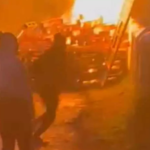“The modern sovereign state of Chile is among South America’s most economically and socially stable and prosperous nations, with a high-income economy and high living standards. It leads Latin American nations in rankings of human development, competitiveness, income per capita, globalization, state of peace, economic freedom, and low perception of corruption”.
So reads the current self congratulatory Wikipedia entry for Chile.
On Friday of last week more than one million people, backed by a number of major strikes by workers, took to the streets in the Chilean capital of Santiago uniting in a call for huge social and political change in the country. It was probably the largest demonstration in that country’s turbulent political history.
Underneath the surface appearance of tranquillity and apathy deep popular anger at massive and rising inequality was simmering especially among the young. Chile has a Gini co-efficient (an internationally recognised measure of income inequality) of 45.9 % which is extremely high. Suddenly, triggered by metro fare increases, this simmering anger broke out in mass revolt. It is a pattern being repeated in many countries across the globe: in Lebanon the spark was a tax on WhatsApp.
In early October, the Chilean government of Sebastian Piñera announced that the metro rush hour prices would rise by 30 pesos .
Responding to public outcry against the fare rise, the Minister for Economy, Juan Andrés Fontaine, announced that those upset with the price rise could wake up earlier and pay a lower rate (shades of Leo Varadkar there).
After these remarks outrage grew, leading school students to conduct a mass fare evasion by jumping over the metro turnstiles, and, in some instances, destroying them.
Friday’s monster demonstration came as a culmination of a week of escalating protests. It also came after a week of brutal repression. President Piñera’s first response to the mass fare evasion and violent clashes with the riot police was to declare a state of emergency. He said the country was “at war against a powerful enemy’ and he sent the army onto the streets. A week later at least 19 people were dead and 3100 detained; that is according to official figures which are likely to be a serious underestimation.
The army have been beating people randomly and ruthlessly on the streets, deploying water cannon and firing into the crowds with ‘balines’, lead balls that cause severe injuries and can easily take out eyes. Already by last Monday, the National Institute of Human Rights said more than 1,420 civilians had gone to hospital with injuries from the unrest and at least 84 of those had wounds caused by weapons.
For the Chilean people the presence of the army on the streets and this brutality inevitably evokes memories of dreadful, and not –so- distant, years of the Pinochet dictatorship (1973 – 1990). In 1970 Chile elected a radical reforming Popular Unity government by President Salvador Allende. On 11 September 1973 the Chilean military crushed this attempt at democratic reform in a US backed coup led by General Augusto Pinochet.
President Allende was murdered; thousands upon thousands of left activists were rounded up in the Chilean National Stadium and other improvised concentration camps. As many as 30,000 were killed, including the great people’s singer Victor Jara, whose songs were sung by the demonstration on Friday; many more were imprisoned and driven into exile. The regime was notorious for its utterly brutal use of torture.
And the Chilean people have good reason to fear the return of such repression at the hands of the Piñera government. Piñera himself is a Harvard trained businessman with an estimated net worth of $2.8 billion in 2019, according to Forbes, making him one of the richest people in Chile. When General Pinochet was arrested for his human rights crimes in London in 1998 Piñera described it as ‘an attack on the dignity of Chile’.
His cabinet included Interior Minister, Andrés Chadwick, who was a vocal supporter of Pinochet dictatorship, which had previously appointed him president of the Catholic University Students Federation and Justice Minister, Hernán Larraín, a leading supporter of Colonia Dignidad. Colonia Dignidad was a secretive German enclave in Chile established by fugitive Nazi and paedophile, Paul Schafer in the early 1960s and used as a secret torture centre by Pinochet.
But despite and because of the brutal police and military repression and despite and because of the spectre of this terrible history, the resistance of the Chilean people and the Chilean workers has grown massively.
And it has forced Piñera to retreat. Last Tuesday the President, who on Sunday had declared ‘War’ on the enemy within, announced a limited, and inadequate, programme of reforms and declared he is ‘restructuring’ his cabinet. By Friday evening he was tweeting “The massive, joyful and peaceful march today, where Chileans ask for a more just and supportive Chile, opens great paths for the future and hope. We have all heard the message’.
Obviously these words are not to be trusted. They were uttered only because the Chilean people had put its boot on his neck. The people are not lifting that boot – they are demanding Piñera’s resignation, the fall of his regime and fundamental social change.
People Before Profit is proud to stand with them in this struggle.












